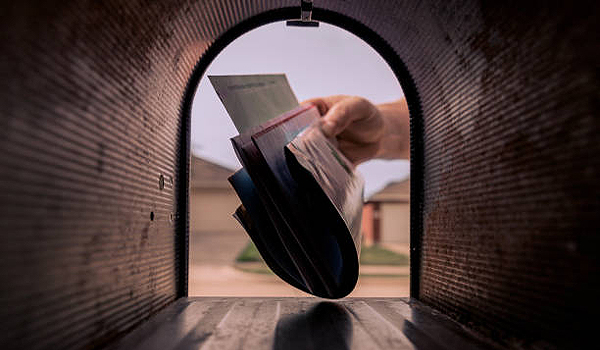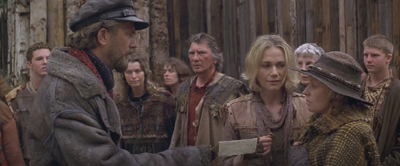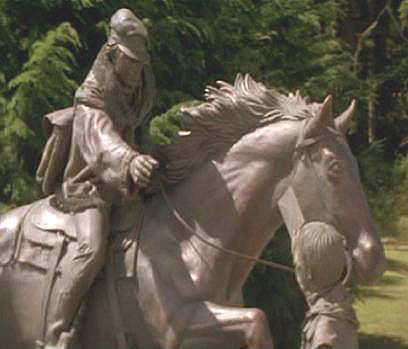|
Good News Delivers Hope |
||
|
The organized system of transporting and delivering postcards, letters, and packages has been a cornerstone of civilization going back to ancient times. It is generally one of the few government services people appreciate and on which they greatly depend. It is sorely missed when delays in service take place due to inclement weather or natural or man-made disasters, and people usually welcome the return to a feeling of normalcy when service is resumed. This is especially true when there is eager anticipation of receiving a letter or gift from family or friends. The Postman is a 1997 post-apocalyptic action adventure film set in the near future based on a 1985 novel of the same title by David Brin, which tells the story of Gordon Krantz, a former drama student at the University of Minnesota, wandering west over the former United States, devastated for sixteen years by the aftermath of several electromagnetic pulse (EMP) attacks, the destruction of major cities, and the release of bioweapons. Small, isolated communities of survivors eking out a living formed in various areas of the country, and Krantz would wander among them, performing scenes from long-forgotten Shakespearean plays in exchange for food, water, and shelter. With the breakdown of law and order, technology, and civilization, over time one or more neo-feudalist warlords would arise. They were a continual threat to surviving communities because they would plunder their scarce resources and seize their people as recruits for their armies. Evading the troops of one of these warlords, Krantz, on a cold, rainy night, stumbled upon a long-dead postman's mail vehicle. Taking his uniform for warmth, he spent the night in the vehicle. The next day, he buried the postman and left with his bag of mail for the nearest community, hoping to trade it for food and shelter.
When the people in the next town saw him in the postal service uniform and he was able to deliver a letter to one of the elderly residents, they believed Krantz's story that he was a real postman from the restored United States government. This filled the people with hope that things would start to turn around and civilization would return. One of the teenagers in the town, inspired by Krantz, was granted his request to be sworn in as a member of the postal service. He helped him set up a post office for the town. When Krantz left for the next community, he took with him mail left at the post office by the people. As word spread about Krantz and his work, hope grew among the residents of the scattered communities across the land. More postmen were commissioned by him, and others were commissioned by them, to deliver the mail and spread the word about the restored United States.
The warlords, wanting to maintain their power, did all they could to destroy Krantz and the work of his followers by hunting them down and killing them, but through the increasing communication and growing unity of the no longer disconnected communities, their tyrannical rule was defeated. Krantz continued his work as a postman, married a woman named Abby (whose husband was murdered by a warlord), and they had a daughter named Hope. Shortly after his death, 30 years later, Hope officiated at the unveiling ceremony of a bronze statue of her father on horseback, reaching down to receive a letter from a young boy. The plaque below said:
Hope's speech, with the attendees wearing untattered, modern clothing and using technology, showed that Gordon Krantz and the postmen he commissioned helped to rebuild the United States. What caught my attention about this story was that historical or fictional narratives involving societal or civilizational cataclysms often do not have a good ending, and they do not include a message of hope that changes people in positive ways that rebuild society. The good news believed by people in isolated communities gave them hope even as they experienced deprivation and danger from their enemies. It connected them with other communities and strengthened them as they spread the word. It is reminiscent of the greatest story ever told. One that is quite real and includes a great tragedy and widespread ruin, a message of hope, a Savior, a magnificent conclusion, and the restoration of all that is good. When global catastrophe came into the world through Adam's sin, instigated by Satan to isolate humanity from God and bring about its destruction, the close fellowship and communication between God and humanity were broken. Suffering, decay, and death became the lot of all who followed him. His descendants, inheriting his fallen nature (Romans 5:12; Ephesians 2:1-3), experienced the terrible consequences of the sins they committed against others and those committed by others against them. But God gave our first parents the promise that He would utterly defeat the works of the devil and restore forever the relationship they once had (Genesis 3:15; 1 John 3:8). He would send a Savior to reconcile the lost world to God (2 Corinthians 5:17-21). Through the following centuries, God revealed Himself to Abraham, Isaac, and Jacob and delivered to them the hope of the coming Savior. He made the descendants of Jacob into the people of Israel, to whom God sent prophets to keep imparting this good news. Thousands of years later, God sent His Son Jesus into the world to be the perfect atonement for our transgressions by His death on the cross and undo the curse brought by Adam's sin for all who trust in Him.
After rising from the dead, Jesus commissioned His disciples to proclaim the gospel message to the world (Matthew 28:16-20). The devil, vainly trying to maintain his power, used his warlords in Jerusalem and Rome to thwart and destroy them. Keeping as many people as possible separated from God and under his domination for their destruction has always been his goal. In spite of severe persecution and martyrdom, the followers of Jesus' grew in number, and they commissioned more disciples. They used the well-engineered and extensive road network of the Roman Empire to spread the good news about Jesus through couriers (or "postmen") who transported copies of the gospels and letters from the apostles. Efforts to isolate believers in Christ and destroy their "mail" failed as they made use of various ways to communicate with each other and strengthen their faith. The hope they held in their hearts for the return of Jesus and His eternal righteous rule increased the numbers of those entering the kingdom of God to such an extent that it overcame the Roman Empire. The Dark Ages that followed the fall of Rome, generally the period between 500 AD and 1000 AD, could not extinguish the light of the gospel and the hope it gave to all who embraced it. Even though his defeat was secured by the life, death, and resurrection of Jesus Christ, Satan uses his warlords today to create technologies and government policies through enticed or coerced isolation, divide-and-conquer tactics, relentless propaganda, and censorship to keep us separated from God and each other. Making America great again will not come from following a particular political leader or movement, but from making America godly again through the proclamation and acceptance of the gospel of Jesus Christ by its people. Just as the postmen of Gordon Krantz delivered good news and hope, bringing isolated communities together to rebuild a ruined country, so all those who hope in Jesus Christ can share with everyone they can the greater hope found in the gospel message:
|
||
| What Is the Gospel? | What Must I Do to Be Saved? | Home | Contact Us | Return | ||


